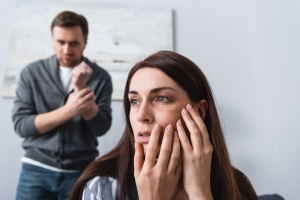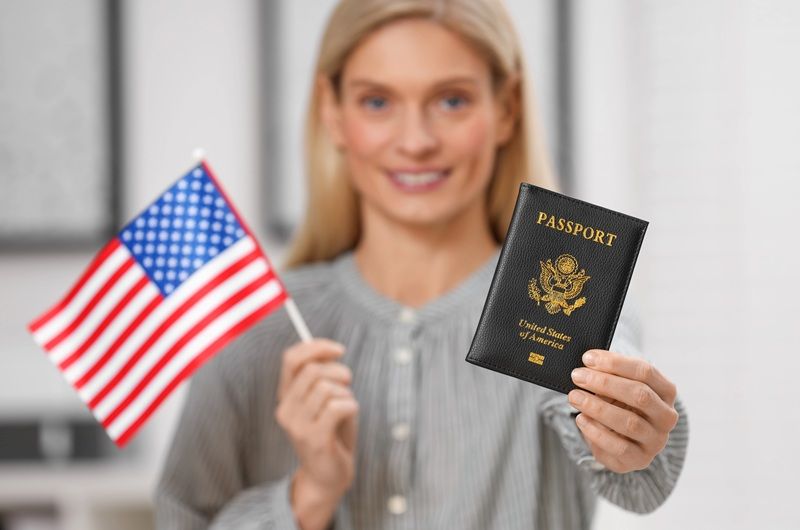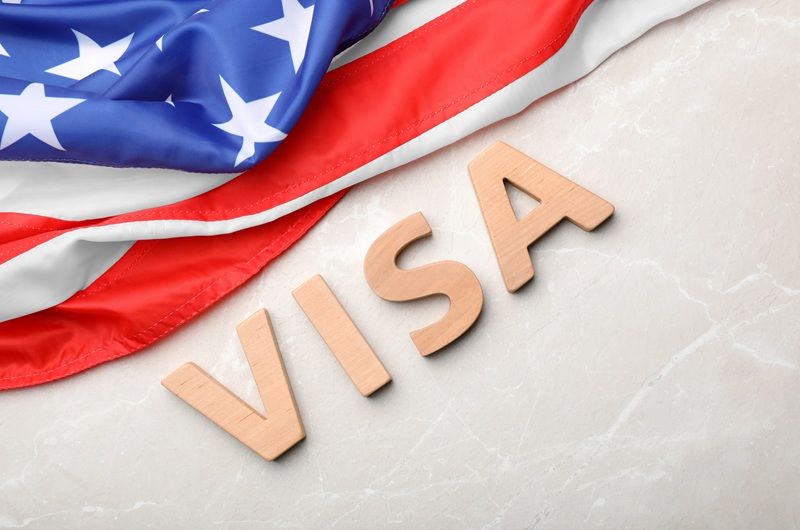What Is A Domestic Violence Green Card?
Domestic violence is a grave concern that affects countless individuals worldwide. In the United States, victims of abuse face unique challenges, especially when they are immigrants.
In these situations, a critical provision offers protection and a pathway to legal status for survivors. This is the domestic violence Green Card, commonly known as the Violence Against Women Act (VAWA) self-petition.
This article will explore the significance of the VAWA I-360 Petition. It will also introduce the U visa as an alternative path for victims. Furthermore, it delves into their effects and how these measures empower survivors of domestic violence.

The Domestic Violence Green Card
Getting a Green Card through VAWA allows survivors of domestic violence to self-petition for lawful permanent resident (LPR) status. Additionally, it aims to break the cycle of abuse by providing a pathway to safety and stability.
Eligibility Criteria
Individuals must meet specific criteria to be eligible for the VAWA. Firstly, they must show evidence that they are victims of battery or extreme cruelty.
Additionally, these acts must be committed by a spouse, parent, or child who is a U.S. citizen or lawful permanent resident. The abuse may include physical violence, sexual assault, psychological harm, or coercive control.
Lastly, applicants must have entered the marriage in good faith and not for immigration purposes. It is crucial to provide evidence of the marital relationship, if applicable.
Benefits Of VAWA Self-Petition Approval
Obtaining the approval of VAWA self-petition offers survivors several crucial advantages. Firstly, it protects them from deportation. This ensures that victims can break free from the cycle of abuse without fear of being forcibly returned to their home country.
The approval also enables survivors to work legally in the United States. This will provide financial independence and establish a secure future for themselves and their children. It also grants access to various public benefits and services, including healthcare and educational opportunities.
The Self-Petition Process
Eligible survivors of domestic violence must navigate the self-petition process to obtain lawful permanent resident status. This process requires careful documentation and a thorough understanding of the requirements. Below are the steps to take to proceed with the application.
Gathering Evidence
Applying for a VAWA green card requires detailed documentation to support the self-petition. Gathering evidence of the abuse is vital, as it substantiates the claims made by the survivor.
This evidence may include police reports, medical records, photographs, witness statements, and affidavits from individuals aware of the abuse. Furthermore, survivors must provide proof of their relationships with the abusive spouse.
These documents include marriage certificates, joint bank accounts, or shared assets. Affidavits from friends, family members, or professionals who can verify the authenticity of the relationship can also strengthen the case.
Confidentiality & Safety Concerns
Recognizing the potential danger survivors may face, the self-petition process prioritizes confidentiality and safety. Applicants can request that their addresses be kept confidential, ensuring that the abuser cannot track them down.
Survivors may waive the joint filing requirement for obtaining a Green Card. However, they must demonstrate that they or their child have been subjected to extreme cruelty by their U.S. citizen or LPR spouse. This waiver prevents the abusive partner from interfering with the immigration process and protects survivors.
Conditional Residency & Removal Of Conditions
This means that when someone gets a Green Card through marriage, their residency status is initially temporary or “conditional.” It’s like a trial period to ensure the marriage is genuine and not just for immigration purposes. This is done to prevent fraud.
After you’ve been a conditional resident for about two years, you need to apply to “remove the conditions” from your Green Card. This involves showing that you’re still in a genuine marriage and continuing to meet the requirements for a Green Card.
If you’re a victim of domestic violence, you may be able to apply to remove these conditions. This applies even if you’re no longer married, and you can do so by showing that the marriage ended due to abuse.
Effects Of The VAWA
First enacted in 1944, the VAWA has since undergone numerous reauthorizations. It aims to strengthen protections for victims of domestic violence, including immigrants. The legislation acknowledges domestic violence as a human rights issue and seeks to provide comprehensive support and resources to survivors.
The most recent renewal of the Act occurred in 2022. It expanded prevention resources, enhanced survivors’ services, and bolstered the legal framework to hold perpetrators accountable. The new update of VAWA shows that the U.S. Government is still dedicated. They promise to keep people safe and protect their rights, even if they’re facing domestic violence and are not from here.
Support Services For Domestic Violence Survivors
Survivors of domestic violence, including those pursuing a U Visa or a Green Card through VAWA, can access various support services. The National Domestic Violence Hotline and local domestic violence shelters provide critical assistance, including legal aid, counseling, and access to emergency housing.
Additionally, legal clinics handling immigration law can guide survivors through self-petition, ensuring they understand their rights and obligations. Seeking support from these organizations is vital in navigating the complexities of the immigration system while addressing the trauma of domestic violence.
U Visa: An Alternative Path For Victims Of Domestic Violence
In addition to obtaining a Green Card through VAWA, noncitizen victims of domestic violence may also be eligible for a U Visa. This is designed to protect and assist victims of certain crimes, including family violence. Once granted, survivors of abuse will obtain temporary legal status in the United States.
Requirements & Benefits Of The U Visa
 To be eligible for a U Visa, victims must meet specific requirements, including the following.
To be eligible for a U Visa, victims must meet specific requirements, including the following.
- The applicant must have experienced a qualifying crime done to them.
- They must have suffered substantial physical or mental abuse from qualifying crimes.
- The person must be willing to assist law enforcement in investigating or prosecuting the crime.
The U Visa provides victims temporary legal status, work authorization, and the possibility of obtaining lawful permanent resident status.
Qualifying Crimes
The list below shows crimes that count as “qualifying criminal activities” for getting a U Visa.
- Abduction.
- Blackmail.
- Kidnapping.
- Being Held, Hostage.
- False Imprisonment.
- Abusive Sexual Contact.
- Domestic Violence.
- Extortion.
- Felonious Assault.
- Female Genital Mutilation.
- Fraud in Foreign Labor.
- Manslaughter.
- Murder.
How An Immigration Lawyer Helps
Navigating the complexities of domestic violence and immigration laws can be overwhelming for survivors seeking safety and justice. Law firms, such as Lincoln-Goldfinch Law – Abogados de Inmigración, play a crucial role in providing guidance and support throughout the process. Below are some ways a legal team can assist family violence survivors.
Experience In Domestic Violence And Immigration Laws
Immigration lawyers have the knowledge and experience to navigate immigration laws. They understand survivors’ unique challenges and can provide legal advice addressing individual circumstances. Additionally, they can help survivors understand their rights, navigate the legal process, and make informed decisions.
A skilled VAWA attorney can help with the complex self-petition process. Law firms handling legal cases can help survivors gather the necessary evidence and prepare a solid case. They can ensure that all requirements are met, increasing the chances of obtaining a VAWA Green Card.
Prepare Documents & Gather Evidence
Immigration attorneys assist survivors in gathering the necessary evidence to support their self-petition. This includes compiling police reports, medical records, photographs, witness statements, and affidavits that substantiate the claims of abuse.
Meet Eligibility Requirements
Experienced attorneys assess a survivor’s eligibility for VAWA self-petition. They ensure that the survivor meets the criteria, such as demonstrating battery or extreme cruelty, providing evidence of the relationship, and meeting the good faith marriage requirement.
Confidentiality & Safety Concerns
Recognizing the potential risks survivors face, legal representatives prioritize confidentiality and safety. They help survivors request confidential addresses and navigate processes that protect them from potential abusers.
Appeals & Legal Strategies
In cases where a self-petition is denied or faces challenges, immigration attorneys can explore and develop legal strategies to overcome obstacles. They leverage their legal skills to present a strong case for reconsideration.
Collaboration With Support Services
Immigration law firms often collaborate with support organizations and shelters specializing in domestic violence. This collaborative approach ensures survivors receive comprehensive legal, emotional, and practical assistance.
Domestic violence affects many worldwide, especially immigrant victims in the United States. The Violence Against Women Act (VAWA) provides protection and a path to legal status, known as the domestic violence Green Card. Benefits of VAWA approval include protection from deportation, work authorization, and access to public benefits.
Moreover, the U Visa offers temporary legal status. Requirements and benefits are detailed, with listed qualifying crimes. The process involves gathering evidence, prioritizing confidentiality, and navigating conditional residency removal.
VAWA’s recent renewal emphasizes the U.S. Government’s commitment to safeguarding all victims, regardless of origin. Thus, more support services are available to assist survivors of family abuse. Additionally, legal firms, like Lincoln-Goldfinch Law – Abogados de Inmigración, aid survivors in this complex journey by providing them the legal representation they need to self-petition for permanent residency.
Contact A U.S. Immigration Attorney Today!
Categories
How To Find Us
What Our Clients Say
“This Lawfirm is great, very professional and helpful. I love that they are always in communication and always available for when you have questions . 100% recommended by me and my family. Thank you Lincoln-Goldfinch Law – Abogados de Inmigración”





